-
At least 200,000 tons of oil, gas from Deepwater Horizon spill consumed by bacteria

Researchers have found that, over a period of five months following the disastrous 2010 Deepwater Horizon explosion and oil spill, naturally occurring bacteria which exist in the Gulf of Mexico consumed and removed at least 200,000 tons of oil and natural gas that spewed into the deep Gulf from the ruptured well head
-
-
The spring 2010 BP oil disaster could have been prevented: expert
The BP oil disaster in the Gulf of Mexico during the spring of 2010 could have been prevented if the experiences of earlier disasters had been put to use, an expert claims; the U.S. government is now accusing BP of gross negligence and deliberate misconduct, and taking the company to court
-
-
Hurricane Isaac tests Loyola University's emergency response plans
In the days following Hurricane Isaac’s slow march across south Louisiana, Loyola University New Orleans administrators have been reviewing their response with a critical eye to ensure emergency preparations continue to evolve and meet the demands of each situation; beginning Tuesday, 28 August, New Orleans felt the first of Isaac’s high winds and heavy rains – but Loyola University was ready
-
-
New search-and-rescue tool: remotely controlled cockroaches
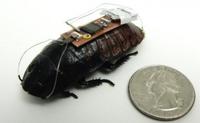
Researchers have developed a technique that uses an electronic interface to remotely control, or steer, cockroaches; remotely controlling cockroaches would allow first responders to create a mobile web of smart sensors that uses cockroaches to collect and transmit information, such as finding survivors in a building that has been destroyed by an earthquake
-
-
Protecting buildings from earthquakes by hiding them
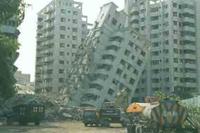
Engineers have come up with an inventive and exciting idea for protecting buildings from earthquakes: hide them (the buildings, that is); the engineers say that placing specialized rubber under the building would diverts certain temblor shock waves, leaving the building virtually untouched by them
-
-
Scientists question earthquake prediction methods
From 2008 to 2011, three earthquakes have significantly damaged different parts of the world. Those quakes were significantly underestimated by scientists and seismologists
-
-
Coastline erosion due to rise in sea level greater than previously thought
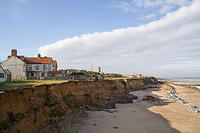
The effects of coastline erosion as a result of rising sea-level rise can be measured by acceptable engineering tools, but such an erosion in the vicinity of inlets, such as river estuaries, has until now been underestimated – and more difficult to calculate; scientists have develop a new model to calculate this more complex erosion, making a valuable contribution to coastal management, planning, and infrastructure protection
-
-
MIT expert: “toxic” political discussions limit climate response
In a talk at the Sandia National Lab, an MIT expert says the inability of natural and social scientists to convince political leaders that “we’re spinning a roulette wheel over climate change” puts humanity at “extreme risk,” and that the difficulties in using science to push for mitigation strategies are more political than scientific
-
-
In China, corruption blamed for collapse of bridges
Since 2011 eight bridges have collapsed in China, according to the state run media, including the Yangmingtan Bridge in the city of Harbin last November; the bridge was almost 10-mile long and construction was originally estimated to take three years, but workers finished it in half the time; when the bridge collapsed, the first thing on people’s mind was corruption
-
-
Earthquake hazards map contains deadly flaws

Three of the largest and deadliest earthquakes in recent history occurred where earthquake hazard maps did not predict massive quakes; scientists recently studied the reasons for the maps’ failure to forecast these quakes, and explored ways to improve the maps
-
-
Trade-offs between water for food and for curbing climate change
Earth’s growing human population needs fresh water for drinking and food production. Fresh water, however, is also needed for the growth of biomass, which acts as a sink of carbon dioxide and thus could help mitigate climate change. Does the Earth have enough freshwater resources to meet these competing demands?
-
-
As Hurricane Isaac beats on New Orleans, new infrastructure is holding up
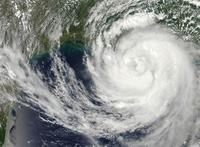
This week, as Hurricane Isaac was threatening to replicate the physical damage that Katrina inflicted, it has become apparent that $14 billion worth of changes and improvements in infrastructure, planning, and emergency response procedures have given the city of New Orleans and the Gulf states the ability to withstand the worst of the storm
-
-
Isaac leaves flooding, power outages in its path
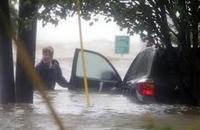
Hurricane Isaac lost its Category 1 hurricane status midday Wednesday and was downgraded to a tropical storm, but the severe rains and winds which it brought with it have not let up much; the number of power outages continues to increase as the number of homes and businesses without electricity is now up to 834,000 between Louisiana, Mississippi, Alabama, Florida, Texas, and Arkansas, with over one-third of the outages in Louisiana alone
-
-
Drones being used to track hurricanes

Federal hurricane trackers will start experimenting with unmanned boats and aircrafts to learn more about how to anticipate and track the movements of hurricanes; NASAand the National Oceanic and Atmospheric Administration(NOAA) are teaming up and using a pair of military-surplus Global Hawk spy drones, which are known more for spying on battlefields than chasing storms
-
-
Underground organisms play a more complex role carbon capturing than previously thought
In a surprising finding, researchers have shown that certain underground organisms thought to promote chemical interactions that make the soil a carbon sink actually play a more complex, dual role when atmospheric carbon levels rise
-
More headlines
The long view
The Surprising Reasons Floods and Other Disasters Are Deadlier at Night
It’s not just that it’s dark and people are asleep. Urban sprawl, confirmation bias, and other factors can play a role.
Why Flash Flood Warnings Will Continue to Go Unheeded
Experts say local education and community support are key to conveying risk.
